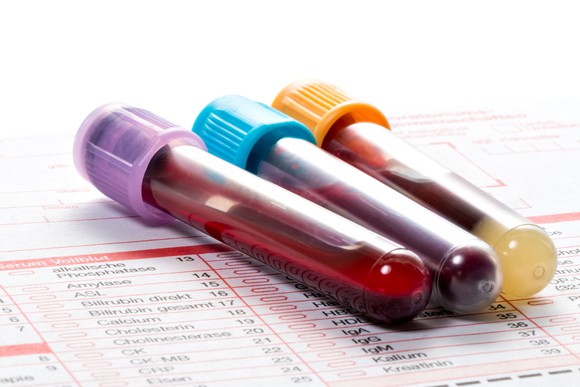After releasing data from the Reduce-It clinical trial that showed its lipid-lowering drug, Vascepa, reduced the risk of having a major cardiovascular event, Amarin (AMRN 0.64%) closed up 314%.
That's an overnight quadruple.
But the biotech wasn't done. Over the next three weeks or so, shares have increased an additional 66% for a whopping 590% return from the predata close.
Doubles and even triples aren't that unheard of in biotech, but overnight quadruples -- or quintuples over a few weeks -- are pretty rare, especially for a drug that was approved back in 2012, making it worthy of a closer look to see why it's up so much and to have a better chance at spotting the next Amarin.
No turning back
One of the main reasons for the massive increase isn't really a strength: Amarin doesn't have many other options. It was Vascepa or bust for the biotech, since the company doesn't have a meaningful pipeline beyond Vascepa.
And Vascepa hasn't exactly been a big seller. Sales of Vascepa were up 17% year over year in the second quarter but only rang in at $52.5 million. Annualized out, that's a little more than $200 million in sales, certainly nothing to get excited about.
But Vascepa's potential sales change dramatically with the Reduce-It data. The cardiovascular events data is substantially more compelling than previous data used to get the drug approved that only showed the drug lowered triglyceride levels. Doctors and patients are rightfully more interested in outcomes -- heart attacks, strokes, and the like -- than in blood diagnostic reports.

Image source: Getty Images.
Equally important, Reduce-It tested Vascepa in patients with moderately high triglyceride levels, where the previous approval was only for extremely high triglyceride levels, so the drug will be used in a broader population. Assuming the FDA updates the label with the new data, which seems highly likely, blockbuster status topping $1 billion annually isn't out of the question.
This was a classic binary situation in biotech. Amarin had high potential if Reduce-It was positive but would be almost worthless if the trial failed, so investors couldn't put a high valuation on Amarin before the trial results came in, resulting in a monster one-day return.
If Amarin was the size of a big biotech, such as Celgene, with multiple drugs supporting its valuation, the approximately $2.8 billion increase in market cap that Amarin experienced the day the data was released would only result in a modest increase in the share price, considering Celgene's $58 billion market cap.
Adding on is hard
But there's more to the story than just a simple binary event. The Reduce-It results were truly remarkable, which helped contribute to the huge increase after the results were released and has fueled continued momentum as the weeks have gone on.
All the patients in the trial were on cholesterol-lowering statins, which already do a pretty good job at lowering cardiovascular risk. Other drugmakers have had a tough time showing they can further decrease the risk beyond what statins provide, making the 25% reduction in risk for patients taking Vascepa compared to the control group pretty remarkable. Investors weren't expecting nearly that large a reduction in risk, which greatly added to the upside.
Finding the next Amarin
As exciting as it is to find the next Amarin, I'd argue that looking for the next quadruple is not necessarily the best strategy for outsized returns in the biotech space. For every overnight quadruple due to a binary event, there are probably 10 or more companies that are going to go broke trying. Those are not really great odds.
The biggest lesson in Amarin's success is to find companies with the potential to exceed expectations. Outcomes-based results for silent diseases -- such as high lipid levels that don't cause trouble until someone has a sudden heart problem -- offer the biggest opportunity for outsized sales growth from better-than-expected results. Investors looking for the next big silent disease should check out companies developing drugs for nonalcoholic steatohepatitis.
